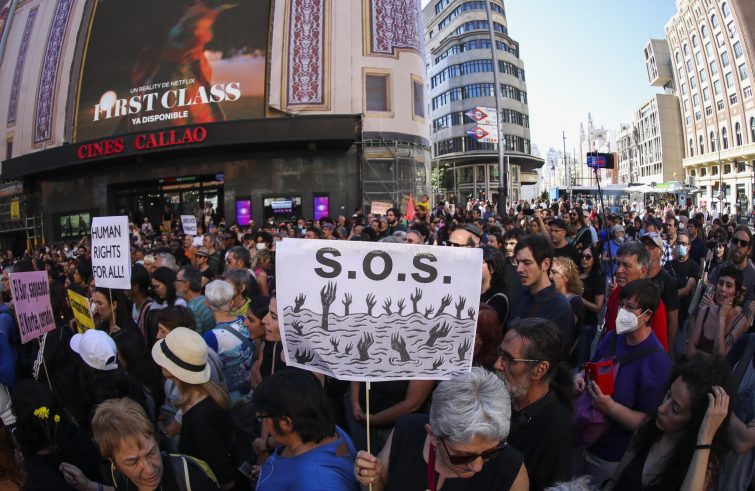
Friday night’s incident in Melilla – constituting with Ceuta the land borders between Spain and Morocco – turned out to be an outright massacre of migrants caught between Europe and Africa, Spain and Morocco. At least thirty-seven were killed, hundreds were injured, most of them migrants, as well as law enforcement officers. The bloodbath, the latest in a series of such incidents – among those that have claimed more than 4000 lives among Syrian, Palestinian, and Sub-Saharan migrants today – occurred in Morocco, which in the mid-1990s built together with Spain, the first two – at Ceuta (in 1993) and at Melilla (in 1996) – of sixteen walls that fence off Europe’s borders today.
A six-metre fortified fence funded by the EU, like others put forward in the 2021-2027 EU action plan. Refoulement or pushbacks of migrants from Libya or Egypt or Turkey attempting to cross the Mediterranean Sea are also funded by the EU; as are the asylum seeker camps in Turkey, Morocco and Libya.
A few of them, probably 1,000 migrants, have managed to safely reach Spanish territory thanks to the sacrifice of their fellow travellers. These include unaccompanied minors, who are embarking on such journeys in growing numbers, children more than brothers who deserve a home, a family, and not a wall of suffering and violence. Not a wall of death.
With them too we are called to build our future, Pope Francis reminded us in his Message for the 108th World Day of Migrants and Refugees. However, the images arriving from Melilla these past hours would appear to negate this call, denying the fact that migration is a blessing, and succumbing to closure, fear, and border limitations instead.
This last tragedy, these deaths, derail the progress of a solidarity-based Europe that seemed to be moving forward, not least because of the tragedy of the Ukrainian war and the millions of refugees welcomed into Europe.
“Walls are immoral,” denounced wholeheartedly David Sassoli, in the last stage of his illness.
Walls are of no use for stopping migrants and refugees, as evidenced by ever increasing numbers of migrants and refugees, the latter now numbering 100 million.
More than walls we need pathways, corridors that provide a safe route for people fleeing war, environmental disasters, human trafficking and destitution.
Rather than creating refugee camps, it is necessary to open up the countless closed homes, those in depopulated villages, in the childless households of an increasingly weary and ageing Europe.
Migrants and refugees are God’s gift to our history,
to our cities, which are called to rethink public space, the places where people live, work; the realms of culture and the places of worship, embracing the ‘culture of encounter’ that Pope Francis never tires of invoking, rejecting the rhetoric of confrontation, rejection, abandonment and exclusion that underpins all too many migration policies.
Tearing down the walls – Europe’s 16 walls and the world’s 70 – would be an act of civilisation,
of that very civilisation of love called for by St Paul VI and St John Paul II, the civilisation of fraternity that permeates the pages of Pope Benedict XVI’s Caritas in Veritate and Pope Francis’ Fratelli tutti: an act of democracy.
(*) Archbishop of Ferrara-Comacchio, President of the Episcopal Commission for Migration ( CEMI), and of the Migrantes Foundation











